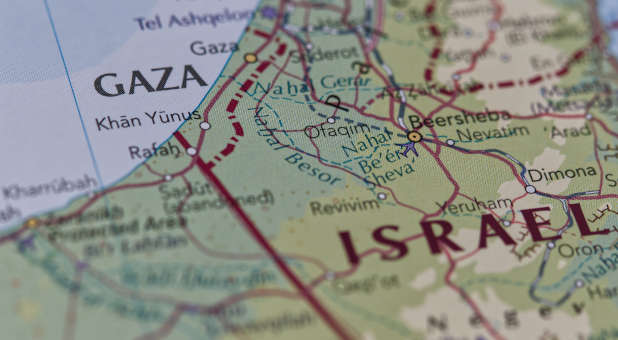100 Days In: The Israel-Hamas War
On Oct. 7, 2023, the world witnessed a massacre on a scale it had not seen since the Holocaust.
The attack by Hamas, which occurred on the Jewish holiday of Simchat Torah, sparked a war that has unfolded between the two sides and the international community at large.
The October 7 Attack
On the morning of Oct. 7, the terror group Hamas launched a coordinated attack on Israel, utilizing a combination of ground forces, rockets and paragliders. The assault targeted multiple locations across Israel, including a music festival which saw hundreds brutally slaughtered. In response, Israel launched a series of airstrikes and ground operations against Hamas targets.
The initial attack resulted in significant casualties. According to the Israeli government, over 1,200 people were killed, and thousands more were injured. Israeli Defense Forces proceeded to systematically hunt down and eliminate the remaining terrorists within their borders, while taking several into custody for interrogation.
International Response
In the immediate aftermath of the attack, the international community was quick to condemn the violence and call for restraint from both sides. The United Nations Security Council held an emergency meeting to discuss the situation, and the UN Secretary General issued a statement calling for an immediate cessation of hostilities.
The United States, the European Union and other major powers also issued statements condemning the attack and calling for a return to peace talks. However, these calls were largely ignored by both Israel and Hamas, who continued to engage in military operations against each other.
As the war continued however, the narrative quickly shifted. Antisemitism against Jews and Israel worldwide flared as protests against the Israeli response filled the streets of major cities worldwide. The media also turned against Israel as calls for a ceasefire echoed from pro-Hamas supporters, while few called for an immediate release of the hostages prior to a ceasefire taking place.
Huge protests in support of Palestine around the world
London pic.twitter.com/gtAAwjcJfF
— In Context (@incontextmedia) October 28, 2023
The Escalation of War
In the weeks and months following the Oct. 7 attack, the conflict between Israel and Hamas continued to escalate. Israel launched numerous airstrikes and eventually began ground operations in Northern Gaza. Meanwhile, Hamas has relentlessly targeted Israeli cities with rocket attacks from within Gaza. Utilizing Israeli intelligence, targets across the Middle East with known Hamas associations were targeted.
The conflict also had a significant impact on the civilian population. According to the UN, over 10,000 Palestinians have been displaced from their homes, and many more are living in dire conditions due to Hamas’ confiscation of humanitarian aid and funding.
Instead of international aid being used for humanitarian aid, “terror tunnels” were built throughout much of Gaza, allowing the extremists to continue their war against Israel.
As the Israeli military gained more and more territory in Gaza, these tunnels were systematically destroyed through flooding or demolitions.
The Role of the International Community
As the conflict between Israel and Hamas has continued to escalate, the international community has struggled to find a way to bring about a peaceful resolution. Despite numerous calls for restraint and the resumption of peace talks, Hamas continues attacks against Israel, while Israel will not cease operations until Hamas has been eradicated and the hostages released.
The United States, which has traditionally played a key role in mediating between Israel and the Palestinians, has been largely absent from the current conflict. Carrier groups of the U.S. Navy moved into the Mediterranean as a potential deterrent, but have largely just been a show of force until recent strikes against Houthi rebels in Yemen were conducted in early January. The rebels had been attacking shipping lanes entering and exiting the Red Sea as a way of fighting against Israel and supporting Hamas.
A Large-Scale Air Campaign against the Houthi Terrorist Group in Western Yemen consisting of Hundreds of Missile and Airstrike by the United States and Britain is reportedly Imminent tonight, with Strikes expected to begin sometime in the coming hours. pic.twitter.com/ZqbqLnEqx4
— OSINTdefender (@sentdefender) January 11, 2024
The European Union, generally supportive of the Palestinian cause, has also struggled to find a way to bring about a peaceful resolution. EU leaders have condemned the violence and called for a return to peace talks, but they have been unable to exert significant pressure on either side to change their behavior.
The Future of the Conflict
As the conflict between Israel and Hamas entered its third month, the future still remains uncertain. Both sides remain deeply entrenched in their positions, and there is little indication that either side is willing to make concessions to their demands.
The international community, meanwhile, appears to be at a loss for how to respond to the ongoing crisis. With the United States not yet present at the negotiating table and other major powers struggling to exert influence, it is unclear what role, if any, the international community can yet play in bringing about a peaceful resolution.
In the meantime, the conflict continues to take a heavy toll on the civilian population. With thousands dead and many more injured, displaced or living in dire conditions, the human cost of the conflict continues to mount. As the situation continues to deteriorate, fears continue that this conflict will not only continue for some time into the future, but will drag in more and more of the world around it into a lengthy conflict with no sight in end. {eoa}
Join Charisma Magazine Online to follow everything the Holy Spirit is doing around the world!
James Lasher is Staff Writer for Charisma Media.














































